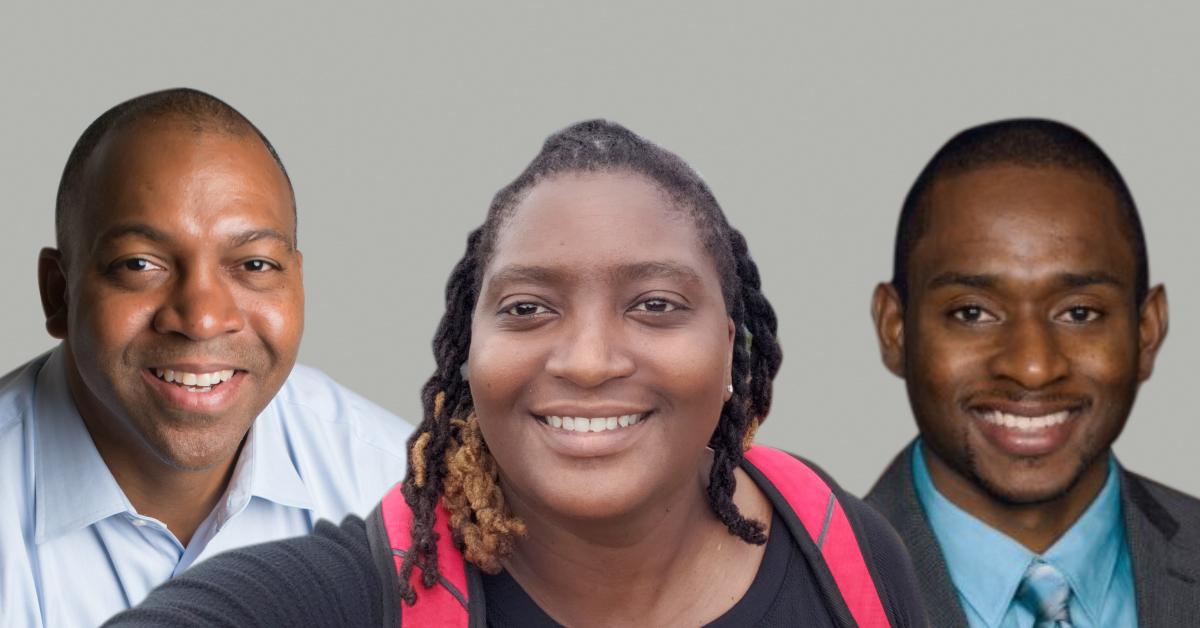Celebrating Black Excellence at Intel

At Intel, we’re committed to creating a more diverse workforce and world. Bringing rich experiences and perspectives, our employees enable us to continue to innovate at the highest levels. We’re proud to amplify the experiences of our Black employees, highlighting the immense contributions and talents they bring to Intel every day. Read a few of their stories below, and learn how Tyrone, Khary, and Vernetta are empowered to transform the industry, working toward a more inclusive world, in which people can live authentically.
Tyrone Benson, Quality and Reliability Engineer
I grew up in a small town approximately an hour north of Auburn, Georgia, and my family had a lot of love but not a lot of money. No one in my family had ever attended college. But when my parents saw my gift for math and science, they really supported me, urging me to go to college because they saw education as a way up in the world. When I received a scholarship to Georgia Tech, it really changed my life because it was the first time I could focus on myself rather than worrying about making ends meet. When you live in survival mode, it’s hard to feel like you can self-actualize.
After Georgia Tech, I pursued my master’s degree and PhD at Michigan. It was a very difficult transition, because I was one of the few Black men in my program and I felt isolated. But I had such incredible support from my community back home. When I received my PhD, my town actually offered to throw me a parade. It didn’t end up working out, but I still get emotional when I think about how much people were rooting for me.
Speaking of communities, I’ve been part of Intel for almost 25 years. I am what I like to call “Intel born and bred.” When I was at Georgia Tech, the minority engineering program reached out and asked if I would be interested in interviewing for an internship at Intel. I interviewed, got the position, and it changed my life. I really learned what it meant to be an engineer during the three years I spent as an intern. After I graduated with my PhD, I knew exactly where I wanted to be.
Currently, I work as a quality and reliability engineer, making sure all our products work how they’re supposed to work and maintain reliability for the lifetime of the product. Intel’s the only company I’ve ever worked for, and I feel so lucky to have spent my entire career here.
Of course, nobody’s perfect, and not every experience at Intel has been a positive one. I’ve been in groups where I didn’t feel part of the team, but for the most part, I feel very much included. Looking back, I know how feeling included really impacted my performance. It changed the way I look at leadership—I want to create spaces where people can be themselves instead of what they think I want them to be. We really have to be dedicated to allowing people to be their authentic selves, so all they have to worry about being judged on is their ability to perform their role.
Khary Alexander, CPU Architect
I’m originally from Grenada, an agriculture and tourism based island in the Caribbean primarily comprised of the descendants of African slaves. So, growing up I never felt like a minority. As a child, I loved science and math and thought I might attend medical school on the island—but then my mom enrolled me in a summer coding program, where I really fell in love with STEM. After high school I followed in my father’s footsteps and attend community college on the island.
After I graduated from community college, I moved to Brooklyn, NY to attend Polytechnic University and graduated with both my Bachelors and Master’s Degrees in Computer Engineering in four years. This was post-9/11, and the job market was neither rich with opportunities nor welcoming of minorities. So while I received the University’s “Most Outstanding Graduate” honor that year and was featured in my local newspaper, I actually decided to cut the kinky dreads I wore at the time to minimize any potential stereotypes recruiters and companies may have. I was blessed to be one of the few graduates from that year’s advanced program to land a job at IBM, in upstate New York. While I had other, and some better, job offers in other states it was important to stay close to home and the broader Grenadian and West Indian community in NY.
Now I’m a Central Processing Unit (CPU) Architect at Intel. It’s incredibly exciting because we’re one of the top three CPU teams in the world, and an industry leader. My job is to understand the capabilities of our CPU systems and to find ways to expand them. I’m surrounded by experts, and every day presents another opportunity to learn something new.
As an immigrant, I don’t exactly connect with the African-American experience. We are both descendants of African slaves, but the histories diverge there. That is why I think it’s so important that we have Employee Resource Groups (ERGs) like the Network of Intel African Ancestry (NIA) I help lead, where we can create a community of support and help reconcile those experiences. My wife and I are also very involved in our local – multiethnic and multigenerational – church. As parents of two black boys who were born in America, we’re incredibly invested in changing the stereotypes facing Black men in the United States.
Vernetta Dorsey, Product Security Staff Engineer
I grew up in Atlanta, Georgia, and was the youngest of six children raised by two military veterans. While none of my siblings were interested in following in their footsteps and going into the military, Mom and Dad always encouraged us to go to college, no matter the obstacles. I accepted an Army ROTC scholarship to attend the University of Denver, where I ultimately graduated with a degree in computer science. I spent nine-and-a-half years in the Army and was stationed all around the world, working as a telecommunications officer. I transitioned back to civilian life when I realized I was gay, because at the time the “don’t ask don’t tell” policy was enforced.
My first civilian job was working in a major financial company. I was not fully fulfilled in my day job and one day, I ran into an old friend from high school that worked at Intel. After talking for a while, they recommended I submit a resume to Intel.
So, that’s what I did. And I’m glad I did, because today I’m an engineer within the Intel Product Assurance and Security Group (IPAS). That means I work with different developers and engineers to make sure our secure development practices are incorporated into products. The bottom line is making sure we have secure products that make it harder for hackers to do their thing.
Additionally, I serve as a cultural influencer for Intel. We’re in the midst of a massive cultural transformation, and in order to continue moving in the right direction, we need every level of the business committed to change. We have the support of leadership, but more importantly we have a group of individuals throughout the organization making sure words become action.
Early in my military career, I learned the importance of networking and that people know you. So, when I joined Intel, I sought out a number of communities here. I’m a member of the Intel Network of African-American Ancestry, American Veterans at Intel, Intel Gay, Lesbian, Bisexual, or Transgender Employees, and Women@Intel. What I found with each of them is a community of people who share similar experiences, but also people who bring new perspectives. At Intel, when we say inclusion, it’s about putting people at the center of the process. Because at the end of the day, people are our most important product.
Intel is committed to diversity across gender, ethnicity, and affiliation. It is why we strive to build a culture of belonging, creating a space where everyone can contribute to their fullest potential and deliver their best work. Learn more about the bold moves Intel is making toward inclusion with our 2030 RISE Strategy and Goals. For more, follow Intel on LinkedIn and @WeAreIntel on Twitter, Instagram, and Facebook. As well, check out our 2020 Intel Diversity and inclusion report.

